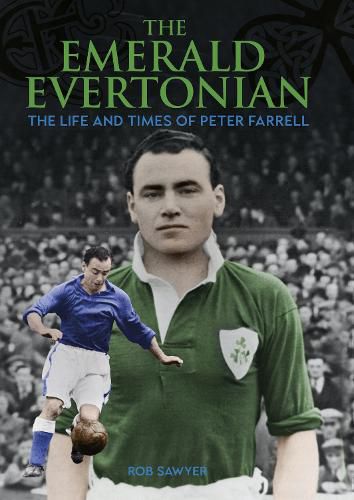Readings Newsletter
Become a Readings Member to make your shopping experience even easier.
Sign in or sign up for free!
You’re not far away from qualifying for FREE standard shipping within Australia
You’ve qualified for FREE standard shipping within Australia
The cart is loading…






This title is printed to order. This book may have been self-published. If so, we cannot guarantee the quality of the content. In the main most books will have gone through the editing process however some may not. We therefore suggest that you be aware of this before ordering this book. If in doubt check either the author or publisher’s details as we are unable to accept any returns unless they are faulty. Please contact us if you have any questions.
From Dalkey to Dalymount and on to Goodison Park, Peter Farrell left an enduring mark on football for both club and country.
With eight minutes remaining at Goodison Park on 21 September 1949, wearing the green of Ireland, Farrell surged towards the Gwladys Street goal and calmly lofted the ball over the England goalkeeper. His strike sealed England's first-ever home defeat to a foreign nation - etched forever into Irish and Merseyside football folklore. That it came on the turf of his beloved Everton made it all the sweeter. It was a defining moment in a distinguished career in blue and green.
Like his modern-day compatriot Seamus Coleman, Farrell is revered as one of Ireland and Everton's greatest captains - leader of character, courage and sportsmanship through testing times.
In The Emerald Evertonian, Rob Sawyer charts Farrell's journey from junior football in Dalkey to silverware with Shamrock Rovers and on to post-war England with Everton, where he arrived alongside lifelong friend Tommy Eglington. Drawing on meticulous research and previously unseen sources, Sawyer also explores Farrell's later life in management - on Merseyside, in North Wales and back home in Ireland - and his dignified 25-year struggle with dementia, sustained by the devotion of his family and community.
This is a compelling portrait of a remarkable footballer and gentleman, and a vivid window into the game during a transformative era.
$9.00 standard shipping within Australia
FREE standard shipping within Australia for orders over $100.00
Express & International shipping calculated at checkout
Stock availability can be subject to change without notice. We recommend calling the shop or contacting our online team to check availability of low stock items. Please see our Shopping Online page for more details.
This title is printed to order. This book may have been self-published. If so, we cannot guarantee the quality of the content. In the main most books will have gone through the editing process however some may not. We therefore suggest that you be aware of this before ordering this book. If in doubt check either the author or publisher’s details as we are unable to accept any returns unless they are faulty. Please contact us if you have any questions.
From Dalkey to Dalymount and on to Goodison Park, Peter Farrell left an enduring mark on football for both club and country.
With eight minutes remaining at Goodison Park on 21 September 1949, wearing the green of Ireland, Farrell surged towards the Gwladys Street goal and calmly lofted the ball over the England goalkeeper. His strike sealed England's first-ever home defeat to a foreign nation - etched forever into Irish and Merseyside football folklore. That it came on the turf of his beloved Everton made it all the sweeter. It was a defining moment in a distinguished career in blue and green.
Like his modern-day compatriot Seamus Coleman, Farrell is revered as one of Ireland and Everton's greatest captains - leader of character, courage and sportsmanship through testing times.
In The Emerald Evertonian, Rob Sawyer charts Farrell's journey from junior football in Dalkey to silverware with Shamrock Rovers and on to post-war England with Everton, where he arrived alongside lifelong friend Tommy Eglington. Drawing on meticulous research and previously unseen sources, Sawyer also explores Farrell's later life in management - on Merseyside, in North Wales and back home in Ireland - and his dignified 25-year struggle with dementia, sustained by the devotion of his family and community.
This is a compelling portrait of a remarkable footballer and gentleman, and a vivid window into the game during a transformative era.